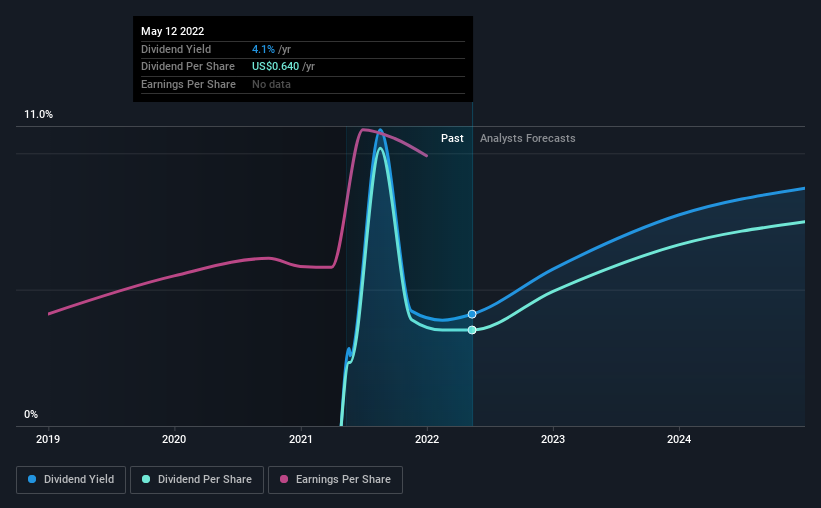Patria Investments' (NASDAQ:PAX) Dividend Will Be Increased To US$0.20
Patria Investments Limited (NASDAQ:PAX) has announced that it will be increasing its dividend on the 16th of June to US$0.20. This will take the annual payment from 4.1% to 6.2% of the stock price, which is above what most companies in the industry pay.
See our latest analysis for Patria Investments
Patria Investments Is Paying Out More Than It Is Earning
Impressive dividend yields are good, but this doesn't matter much if the payments can't be sustained. Prior to this announcement, Patria Investments was paying out 79% of earnings and more than 75% of free cash flows. This indicates that the company is more focused on returning cash to shareholders than growing the business, but we don't think that there are necessarily signs that the dividend might be unsustainable.
Over the next year, EPS is forecast to fall by 0.3%. If the dividend continues along the path it has been on recently, the payout ratio in 12 months could be 116%, which is definitely a bit high to be sustainable going forward.
Patria Investments Doesn't Have A Long Payment History
It is tough to make a judgement on how stable a dividend is when the company hasn't been paying one for very long. This doesn't mean that the company can't pay a good dividend, but just that we want to wait until it can prove itself.
Patria Investments' Dividend Might Lack Growth
Investors who have held shares in the company for the past few years will be happy with the dividend income they have received. Patria Investments has seen EPS rising for the last five years, at 17% per annum. Recently, the company has been able to grow earnings at a decent rate, but with the payout ratio on the higher end we don't think the dividend has many prospects for growth.
Our Thoughts On Patria Investments' Dividend
Overall, we always like to see the dividend being raised, but we don't think Patria Investments will make a great income stock. While we generally think the level of distributions are a bit high, we wouldn't rule it out as becoming a good dividend payer in the future as its earnings are growing healthily. We would probably look elsewhere for an income investment.
Market movements attest to how highly valued a consistent dividend policy is compared to one which is more unpredictable. Meanwhile, despite the importance of dividend payments, they are not the only factors our readers should know when assessing a company. As an example, we've identified 2 warning signs for Patria Investments that you should be aware of before investing. If you are a dividend investor, you might also want to look at our curated list of high yield dividend stocks.
Have feedback on this article? Concerned about the content? Get in touch with us directly. Alternatively, email editorial-team (at) simplywallst.com.
This article by Simply Wall St is general in nature. We provide commentary based on historical data and analyst forecasts only using an unbiased methodology and our articles are not intended to be financial advice. It does not constitute a recommendation to buy or sell any stock, and does not take account of your objectives, or your financial situation. We aim to bring you long-term focused analysis driven by fundamental data. Note that our analysis may not factor in the latest price-sensitive company announcements or qualitative material. Simply Wall St has no position in any stocks mentioned.

 Yahoo Finance
Yahoo Finance 
